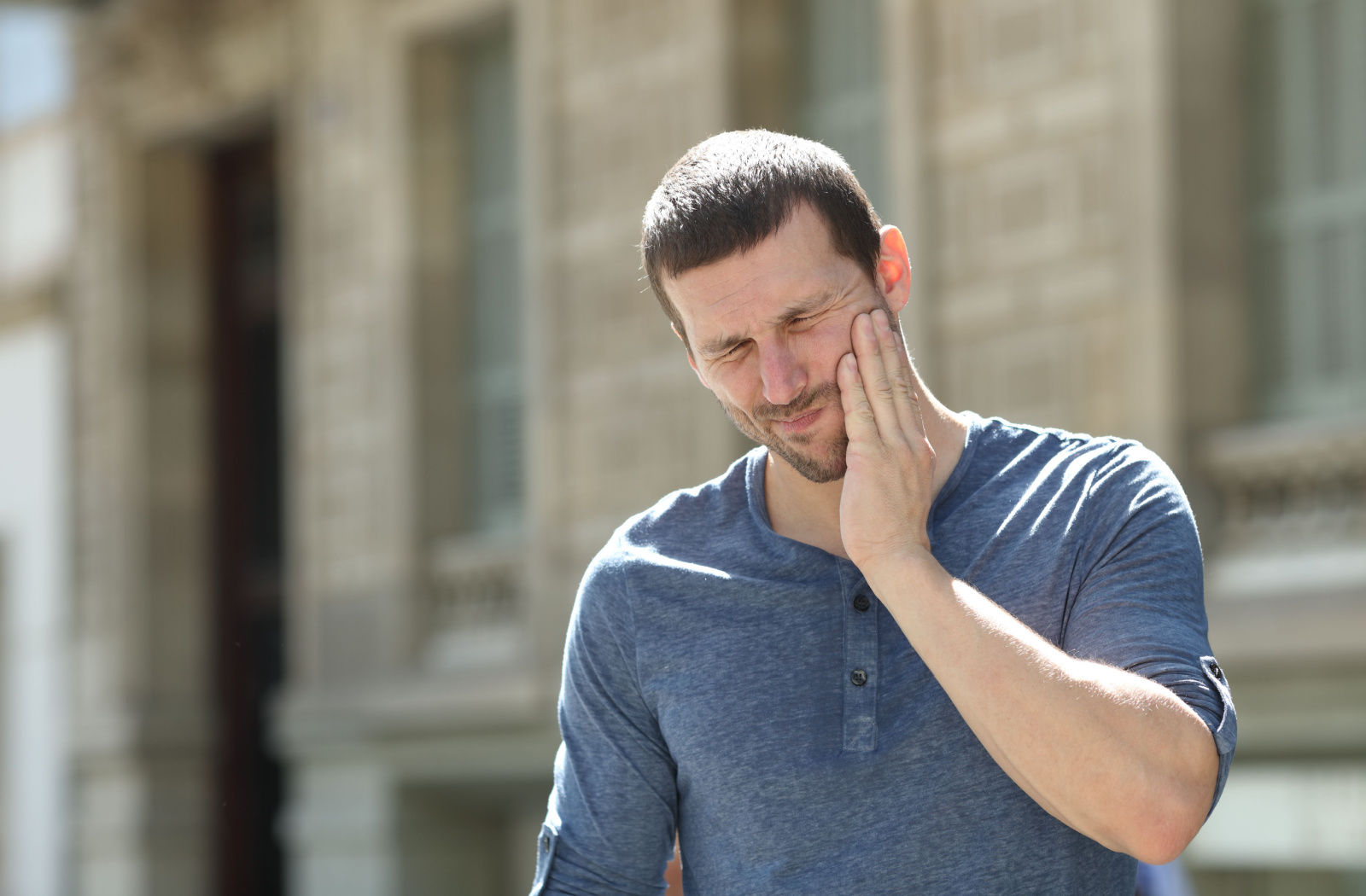Temporomandibular joint (TMJ) disorder can be incredibly painful and frustrating. It often manifests as jaw pain, stiffness, difficulty chewing, and even headaches. While many treatments are available, some are more effective than others. But to avoid it affecting your daily life, it’s crucial to find long-term solutions to achieve a full recovery.
Your dentist can help you understand the source of your TMJ pain. With lifestyle changes and professional treatments such as oral devices, you may be able to cure TMJ disorder permanently.
What Are TMJ Disorders?
The temporomandibular joint connects the jawbone to the skull. It’s a hinge joint that allows you to open and close your mouth and is essential for talking, chewing, yawning, and more. Despite this seemingly simple function, it’s considered one of the body’s most complex joints.
A problem with this joint is referred to as TMJ disorder or TMD, but many refer to it as TMJ which is in fact the name of the joint itself. TMD is shockingly common, with about 25–30% of the population experiencing pain and discomfort in the muscles and bones surrounding the jaw joint.
TMJ disorders can cause you to clench or grind your teeth, potentially causing damage to the teeth and gums. TMJ disorder can aggravate already existing dental symptoms and make it harder to treat these conditions. That’s why a dentist is typically central to resolving TMJ disorders as part of overall oral health care.
Symptoms of TMJ Disorder
TMJ disorder symptoms can vary, and many overlap with other dental problems. Those with TMD may experience one or more of the following symptoms:
- Pain in the jaw joint or facial muscles
- Headaches
- Neck pain
- Limited or no jaw movement
- Jaw tightness
- Upper and lower teeth misalignment
- Painful clicking, popping, or grating when opening or closing the mouth
- Ringing in the ears, hearing loss, or dizziness
Your jaw may occasionally click, but that’s perfectly normal and typically doesn’t require treatment as long as it doesn’t hurt. However, if this click is painful, it may be time to call your dentist.
TMJ dysfunction can be both the symptoms and the cause of other health problems. So, if you’re experiencing tooth pain, sometimes the answer is in your jaw.
Treating TMJ Pain
Ridding yourself of TMD can take multiple steps and approaches.
Understand the Root Cause
The first step in finding a permanent solution to TMJ disorder is understanding its causes. Experts don’t know the exact cause of TMJ disorders, and it may be different for you than it is for someone else.
Causes of TMJ disorder have been narrowed down to a few factors that your dentist can watch for, including:
- Clenching and grinding your teeth (bruxism)
- Misshapen jaw
- Face or jaw trauma and injury
- Jaw joints and muscle diseases, such as rheumatoid arthritis
- Worn, loose, or missing teeth
- Gum problems
- Ill-fitting dental appliances
- Chewing hard objects like pencils or ice
Pain Management
TMJ dysfunction can be debilitating and can lead to intense pain and discomfort. Pain management is a crucial step in curing TMD. Moist heat can help to increase blood flow to the muscles, helping relax and soothe the area and heal damaged tissue. Applying ice can help reduce inflammation, pain, and swelling. You can use a warm towel or take a warm bath to apply moist heat and a cold compress to apply ice.
Over-the-counter or prescription painkillers can manage symptoms. However, these medications only offer temporary relief, so it’s essential to address the root cause to avoid recurring pain.
Practice Good Oral Hygiene
Developing good oral hygiene habits is important in keeping your teeth and gums healthy. Poor oral habits like neglecting to brush or floss regularly can lead to periodontal (gum) disease. Gum disease can lead to tooth loss and jawbone degradation, which can then result in TMJ disorder.
Stop this path to pain at the start. Set reminders to brush twice a day and floss once a day to maintain good oral hygiene.
Physical Therapy
Jaw exercises can help to strengthen the muscles around the jaw and alleviate pain caused by TMJ dysfunction. These exercises are simple to perform and can be done at home.
Open and close your jaw, move it side to side, and gently massage the muscles around your jaw. Take care not to do anything painful.
In some cases, a dentist may suggest professional physical therapy that focuses on the temporomandibular joint. A physical therapist can offer personalized treatments, including exercises, massage, and pain management therapies, to heal TMD holistically.
Avoid Teeth Grinding
Teeth grinding and jaw clenching are some of the most common causes of TMD. This condition, called bruxism, can happen while you’re sleeping, so you may not even know you’re doing it. A custom-made mouth guard fits over your teeth to protect them from damage caused by grinding or clenching.
Stress can also cause bruxism and TMJ disorder, so finding ways to manage stress, such as meditation or yoga, can help.
Seek Professional Treatment
If your TMD symptoms persist, it may be best to see a TMJ specialist. A specialist can recommend treatments tailored to your specific needs, including oral devices like splints to correct jaw alignment and reduce teeth grinding.
However, if the damage is severe, surgery may be necessary, but a nonsurgical solution should be your number one goal. Surgery can be expensive, and the risks involved can lead to prolonged recovery periods. Because TMJ disorder often responds well to home care techniques and nonsurgical treatments, we like to apply noninvasive approaches to treating TMD.

Putting TMJ Disorder in the Past
TMJ dysfunction can be an annoying and painful affliction that can significantly impact your overall quality of life. However, with the right treatment approach, recovery is possible. The Markham Dental Smiles team can work with you to develop a personalized treatment plan that fits your life.
It’s time to take an easy breath, so book your appointment today. With a little dedication and patience, you can finally say goodbye to TMJ disorder forever!







